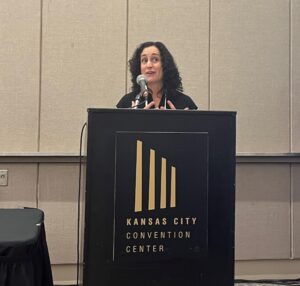
Leah Thomas, PhD. presenting
Trauma in the church can manifest both visibly and invisibly, but many times, trauma remains unseen. On July 6, 2023, during the denomination’s national convention, MennoCon23, Leah R. Thomas, PhD, assistant professor of Pastoral Care; director of Contextual Education for Anabaptist Mennonite Biblical Seminary (AMBS), presented a seminar titled, “Attending to the Presence of Trauma in Churches.” The seminar was focused on the presence of trauma in churches and how church leaders can become equipped to provide trauma-informed care to their communities. Jewel Gingerich Longenecker, dean of Lifelong Learning and co-director of the Doctor of Ministry in Leadership program at AMBS, introduced Thomas at the beginning of the seminar.
Thomas began the seminar with a time of centering and prayer, and a grounding exercise designed to help attendees feel safe and present in their environment while addressing the topic of trauma. The seminar was broken into two major topics around trauma and trauma-informed care. The first was centered on defining trauma and why it is important to pay attention to trauma in churches and ministry settings. The second was to discuss how trauma impacts communities, the components of trauma-informed care and how it impacts ministries of healing.
An attendee of the seminar, Cindy Penner, Hesston Mennonite Church, said, “The topic of trauma is an important one for us to wrestle with as the church. There are people in our congregations who are holding more trauma than we could ever imagine. It is good to have strategies to work with people and to help them, in our churches.”
Trauma is defined as an experience of an event, a series of events or a set of enduring conditions in which the individual’s or community’s ability to integrate the emotional experience is overwhelmed. A quote from Judith Herman, an American psychiatrist, that Thomas shared, said this, “Trauma and traumatic events are not extraordinary, not because they rarely occur, but because they overwhelm the ordinary human adaptations to life.”
A statistic from the Substance Abuse and Mental Health Services Administration, prior to the COVID 19 pandemic, said, “More than two-thirds of children report at least one traumatic event by age 16.” Another statistic, this one from the Post Traumatic Stress Disorder Alliance said, “An estimated seven out of 10 adults in the U.S. have experienced at least one traumatic event in their lives.”
Thomas then addressed three categories in which trauma can present: events, experiences and effects. “Trauma is any experience of the event. It is how well the individual and the community experienced the event and the ongoing effects of that event in an individual and a community,” said Thomas. “An event like a global pandemic is what we would call ‘trauma-genic,’ sort of like carcinogenic.” Some of the different types of spiritual struggles that might accompany trauma can be interpersonal, intrapersonal, and divine. Thomas also talked about the relationship between trauma and grief, saying that, “Not all forms of grief work have trauma, but all trauma has grief.” She continued by saying, “All trauma work IS grief work.”
In the final part of her seminar, Thomas talked about what is needed for individuals and communities to heal from trauma. The three key components that are required are establishing safety, remembrance and mourning, and reconnection with self, others and God. She also named the five components of trauma-informed care, safety, trust, choice, collaboration and empowerment. ended her seminar with two questions for attendees to consider concerning trauma-informed care: “What are you doing well? Where are your growing edges?” There was also time for questions and sharing.
Thomas will be leading a session as part of the Practical Leadership Training modules in the fall of 2023, hosted by AMBS. The in-person seminar is titled, “Practicing Resilience in Response to Trauma” and will be held on September 29, 2023.
By Christle Hain for MC USA

